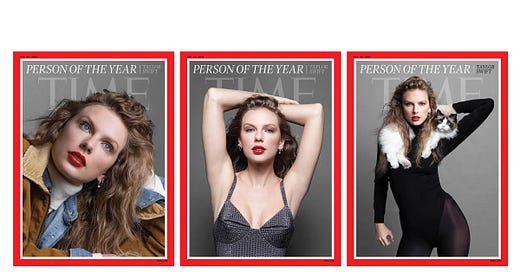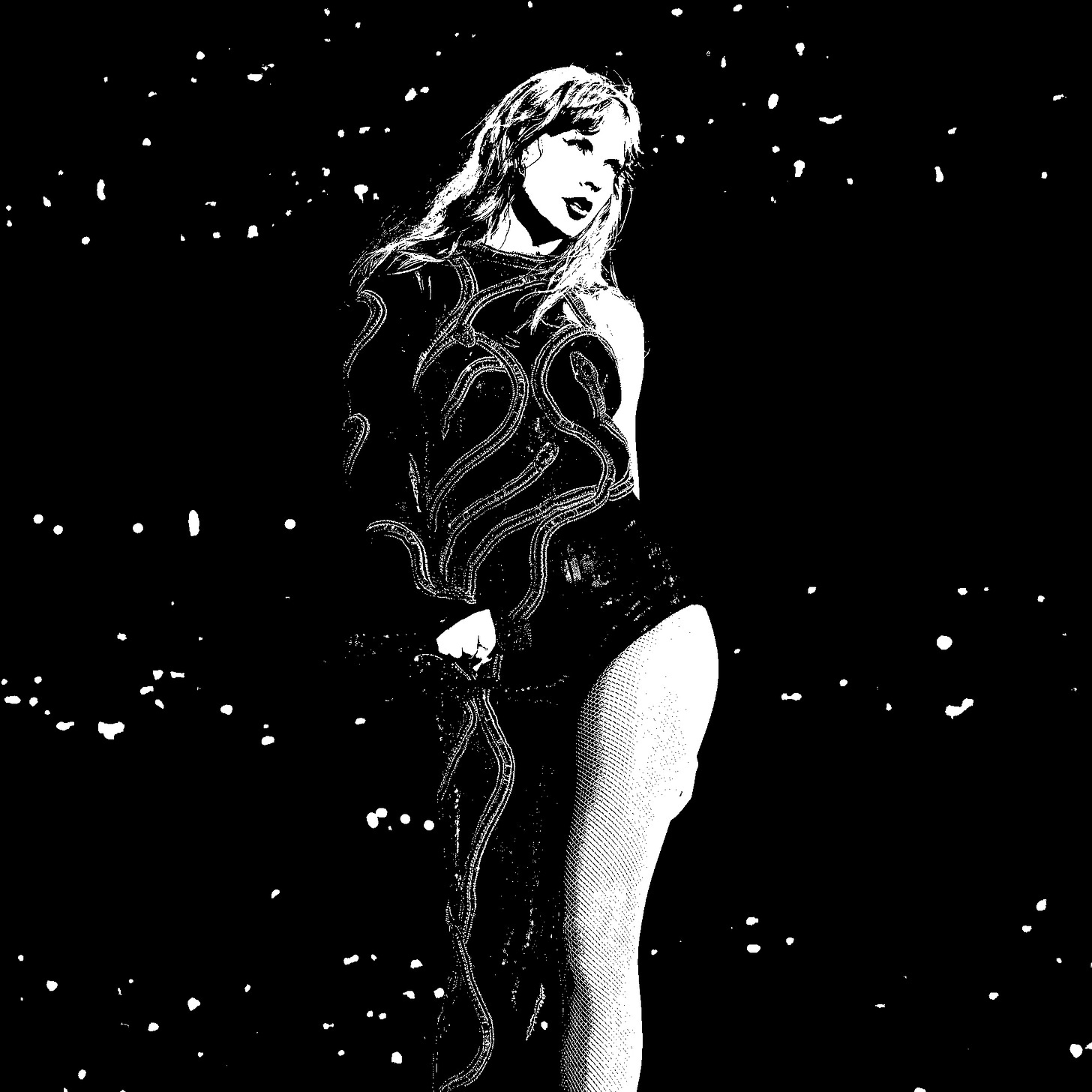Another Essay about Taylor Swift (but this time it's about the rest of us)
On Narratives, Happiness, and the border between Life and Entertainment
This morning, TIME Magazine placed Taylor Swift as 2023’s Person of the Year. It’s an election that’s comes with no surprise. As I wrote about this summer, the songstress is the biggest contemporary music artist with Eras looking to be the most successful concert tour ever.
But this goes beyond sticky hits and cottagecore serenades. Somehow, Taylor Swift, a 33-year-old white woman from Pennsylvania, embodies a chapter of American history that highlights reclamation of ownership, toppling power (Scooter Braun) and unapologetic female ascent (Barbie) against the innocent backdrop of relatable high school storylines (The bully [Kanye West], the mean girl [Kim Kardashian], the football captain boyfriend [Travis Kelce]).
Year after year, it strikes me that TIME rarely designates people of color for their big cover story, especially in this age of racial reckoning. In the pandemic, it would have been tone deaf -- if not controversial -- to outwardly celebrate a slender, blue-eyed white girl with a rhinestone guitar. It’s even odder today, with the Gaza conflict raging in the background, that the pop queen is having her loudest moment of her decades-long career. As far as I can tell, she’s stayed publicly reticent on the war, and still, her star keeps rising. She’s in that same rung of the cultural stratosphere that Kanye and Michael Jackson inhabit – untouchable -- where an individual becomes an idea, transcending identity, cancellation, and expectations. Where fans project themselves onto her instead of the other way around.
Have you read the TIME article? Read it.
Although the photos are uninspired (TIME layouts and creative direction remain frozen in 1997), the article corners the most slippery piece of the Taylor Swift puzzle: the reason why Taylor Swift is the Person of 2023. After a decade of humans becoming brands and brands becoming storytelling vehicles, she’s the preeminent author with the most compelling narrative.
We’ve become fiction writers in a non-fiction world. I’ve been blogging since 1999 and was in the minority of meddling web journalists, documenting the mundane with digital cameras, and finding the anecdotal threads between events to sell a meaningful story. We were roving reporters back then, making our lives the headlines, spotlighting our names on the marquis as the star, director, and writer. I sought meaning and purpose behind random occurrences, at times squinting to make something out of nothing. Today, after years of playing the social media game, most of us have mastered this level of personalized mythmaking.
Whether we publish these stories online or carry them in our head, we edit our lives into three act plays. There are protagonists and antagonists – conveniently compartmentalized as good guys (Beyoncé) and bad guys (Kim). We memorialize the crescendos (Grammys) and mourn the valleys (Kanye). We even frame romances (Travis Kelce) into the plot and score the timeline with tragedies (Brazilian concert fan death).
Instagram went from being a non-sequitur slideshow to a platform that’s literally called Stories, with titles and dramatic climaxes embellished with editing tools. Social media instructed us to make sense of our nonsensical days, formulating disjointed happenings into bite-sized, digestible morsels of content. And so, when the world up-ends, it’s even easier to control through our narrative mechanisms. A pandemic separates us and we unearth the redemptive story of isolation and reunification. War breaks out, we draw up the allies and enemies. When we get fired from our jobs, here is the inspirational quote that sums up the teachable moment.
But most of our stories will never compare to Taylor Swift’s. In fact, I think that’s why we’re finding ourselves more depressed and frustrated than ever. Much of our modern unhappiness isn’t just about a sunken economy, social media malaise, climate change, or political turmoil. It’s that our lives aren’t turning out the way we’d imagined. Just as we’ve written hopeful prologues and mapped out adventurous bodies in our narratives, we’ve also set high expectations against happy endings and perfect-10 dismounts.
However, that’s not real life or the real world. As we know, most of this (gestures to the room around us) is hollow chaos. Still, we’ve plotted such specific coordinates around happiness, success, and purpose into our scripts – the who/what/where/when/how we win – that we’re bound to fall short. Our goals are taking longer than expected. “I was supposed to be married by now.” “Why is that person making more money when I’m better at the same job?” “I’m eating healthier and exercising more. How come I still can’t lose this weight?”
“I thought things were gonna turn out differently.”
Often, joy isn’t waiting for us at the destination. Typically, our expectations are unmet. Life, as we’d planned it, is not gift-wrapping itself with a Taylor Swift lipstick-red bow.
When assholes continue to be rewarded and empowered, when kind people suffer, and when hard work doesn’t pay off, it really fucks with our heads. In Taylor Swift’s world, she learns from dating the toxic, cancelled guy and is rewarded the square-jawed knight. She gets knocked down by Regina George and exacts revenge by teaming up with humble and likable women (Emma Stone, Mandy Moore) to sell out a world tour. The nefarious and greedy Man steals her precious voice. The fairy godmother Kelly Clarkson whispers in her ear on how to steal it back. Swift’s light grows brighter, her career flourishes, she makes more money. Somehow, she grows prettier, more inaccessible but personable, more queer and political (while not committing to either), more popular. And here you are, wondering why you’ve been stuck on a treadmill for the last five years.
Until you realize and accept that the TIME Magazine writer Sam Lansky isn’t the one writing this story. Taylor Swift is. In fact, if you’ve read the piece, it feels like the singer is triangulating the entire time. Typically, with interviews like this, the subject is on the defense, fielding questions, following the leader like dance partners. In the TIME Person of the Year cover story, Taylor Swift comes in hot, possibly rehearsed. It’s like the current distillation of freestyle rap, which isn’t off the top of the dome, but exhaustively produced and choreographed before the battlers even take the stage. Taylor Swift runs circles around the reporter, pitching and editing the story for him as it moves along. In fact, it’s not just Lansky. Swift is hogtying us, the reader, as well. I don’t remember the last time I finished reading a magazine profile and felt like I unwittingly participated in a game against the subject.
And lost.
This is the real reason Taylor Swift works well in 2023. Whether we want to admit it, we know she’s playing us. And the fans do love it. She proudly calls herself Machiavellian and manipulative. She buries Easter eggs in her songs and marketing. The line is never straight. There is a lot of forethought and invisible intention undergirding her work. She doesn’t just perform the song; she also builds the amphitheater around it. Swift downplays her NFL game day outings even though they’re obvious marketing stunts. Like an oiled politician, she seems sincere, but not as genuine and warm as a neighbor. In a 2020 Entertainment Weekly interview, the billionaire said that she spent quarantine watching movies on the couch. I’m sorry, I just can’t picture that.
Merriam-Webster’s Word of the Year is “authenticity,” but I feel like they’re late to the game. Over the last ten years, we’ve pursued, wrestled with, and philosophized authenticity in building our personal brands. We’ve gotten pretty fake, but we’ve also gotten a little too real (see: Twitter). Most detestable of all, we’ve gotten icky fake-real. Virtue signaling, filters, AI, fake news. That which purports itself to be honest but is the boldest lie in disguise.
Taylor Swift is a response to the social uncanny valley. Yes, she is a presentation, detached, removed from the rest of us. Up on a stage, for us to assign our own meanings. But this time, we’re in on the ruse. She’s transparent with a wink. Swift grants us enough space to fill with fantasy and plays into that role. It’s refreshing to have this genre of celebrity again, one that evades pedestrian hiccups. Stars – they’re not like us!
Taylor Swift is entertainment. Not just her music, but her smiles, her paparazzi outings with the girls, her savvy business tactics. And all good entertainment begins with great storytelling. I just think it’s important to be mindful of that boundary between reality and fantasy. It’s one thing to live and experience a life. It’s another to write and edit one. The first is aimless, accidental, and random. Life doesn’t nestle into succinct epilogues, story arcs, and moral-espousing conclusions. The meaning is in the living. The reward is in the learning.
The narrative life, however, is a commercial means of packaging chaos – to make a point, to deliver an idea, to pass history, to sell a product. In the entertainment life, the good guys win, the girl gets the guy, and the hard work pays off. But that’s a movie reduced to milestones and plot devices, where 99.9% of the material ends up on the cutting room floor. Like the countless hours watching movies on the couch. And that’s where life is actually lived.
Nearly all of us won’t ever know a Taylor Swift life. But the reality is, the way she writes it, neither will she. In the same Entertainment Weekly article where she talks about movies, she talks about the makings of her folklore album.
I feel like consuming other people's art and storytelling sort of opened this portal in my imagination and made me feel like: 'Well, why have I never done this before? Why have I never created characters and intersecting storylines? And why haven't I ever sort of freed myself up to do that from a narrative standpoint?...It was really, really freeing to be able to just be inspired by worlds created by the films you watch or books you've read or places you've dreamed of or people that you've wondered about, not just being inspired by your own experience.
Even Taylor Swift, the TIME Magazine Person of the Year, wasn’t fulfilled by her own fantastical life alone. So she poured herself into outside fictions and wrote herself a new narrative. One where she gets off the couch and becomes the most influential person on the planet.







1997 creative direction ™️....you got a good thinker
Well done my friend !